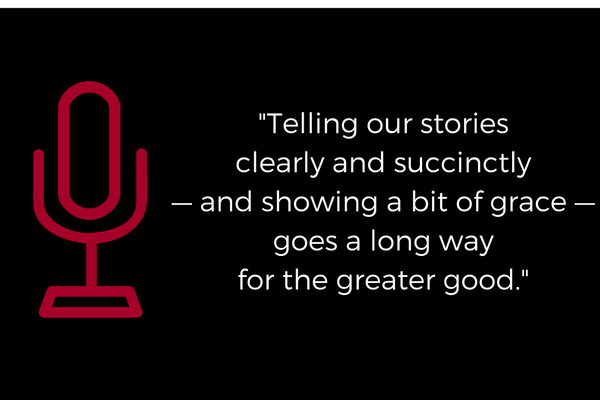The print version of the article hit the newsstands the day after the interview. The digital version was live only hours after the reporter wrapped up her questions.
My kind of reporting — immediate. But with that kind of turnaround also comes the potential for mistakes.
I knew the potential so I carefully pointed out the misunderstandings made by other reporters earlier in the day, but she made other errors.
And I will admit it was frustrating to see my name in print as having said something I did not say and having described something in words I would never use.
Plus everyone personally acquainted with the story knew what was incorrect in the article, so my pride kicked in because I feared they wouldn’t know it was a reporting error and would think it was my mistake.
I had a decision to make. Would I contact the reporter and yell at her or would I think about the situation calmly and be part of the solution rather than create more havoc?
Being a journalist and knowing what it is like to be on the other side of the situation, I decided to be part of the solution.
Yes, she made mistakes in the reporting, so she needed to correct the information.
That’s where I started.
Correcting the facts
I emailed her to thank her for covering the story and turning it around so quickly. I also noted that I understand the difficulty of trying to grasp every angle of a story in a matter of about 30 minutes, then write a story on it in less than two hours.
It is similar to being assigned a research topic in school — something you are not personally familiar with — and having to crank out a summary of the most important points of the topic in a few hours.
Yes, those who carry the reporter title have (or should have) been trained to do the job and are more versatile than most to know which parts of the story are vital and which can be left out. But it is still a tremendous amount of pressure to reconcile in your own mind what exactly the story is and then to relay all the points with perfect factual accuracy.
Focusing on the facts
And you also have the challenge of knowing for sure who the expert is on the subject and who isn’t as well as working to keep the source on topic so you don’t get distracted with unnecessary pieces of information.
Print journalists have an advantage over broadcast journalists because they have a little more time to verify the facts of the story and work to gain a better understanding, but in all news reporting cases, time is extremely limited.
My recent personal experience with being misquoted reminded me of how grateful I am when those we report on in Baptist life take the time to provide information for us in advance so we have a better chance of reporting accurately. It also helps to have the basic who, what, when, where, why and how spelled out in a fact sheet or news release of some sort to save us time chasing down those basic bits of information.
I also realize how all of us can improve our communication in general by remembering that those outside our bubbles cannot understand the parts of the stories we are living at the same level we do. Using slang terms makes for insider language others might misinterpret. Leaving out important details or making assumptions also causes confusion.
Telling our stories clearly and succinctly — and showing a bit of grace — goes a long way for the greater good.
__________________________________________
Rashional Extras
The 5 marks of authentic leadership Influence matters, but it’s not the whole package
By Michael Hyatt
www.michaelhyatt.com
1. Authentic leaders have insight.
Sometimes we refer to this as vision, but that usually has exclusive reference to the future. While leaders must have vision, they need more.
In one passage, the Bible talks about the soldiers in King David’s army. About the men of Issachar, it says they “understood the times and knew what Israel should do” (1 Chron. 12:32). This is what I mean by insight.
Leaders need wisdom and discernment for the present. They need to be able to look at complex situations, gain clarity and determine a course of action.
2. Authentic leaders demonstrate initiative.
Leaders go first. They don’t sit on the sidelines. They don’t ask others to do what they are unwilling to do themselves. Instead, they lead by example. This is what distinguishes leaders from theoreticians and armchair quarterbacks.
This kind of initiative is indispensable because it instills confidence and courage and communicates the kind of dedication that earns trust.
3. Authentic leaders exert influence.
It’s no coincidence that influence and influenza come from the same root word. Real leaders are contagious. People “catch” what they have.
People are drawn to their vision and their values. They are able to gather a following and move people to act.
4. Authentic leaders have impact.
The measure of leadership cannot be found in the leader. It’s found in the impact the leader has on his or her followers.
At the end of the day, leaders make a difference. They’re either instrumental in creating real and lasting change or they’re not leaders. They’re just entertainers.
5. Authentic leaders exercise integrity.
Not every leader is benevolent. We can all think of leaders in business, politics or ministry that have insight, initiative, influence and impact. But when we look at their lives and legacies, we can see something is still missing — something big.
What is it? Their lives are not integrated with the highest values. Integrity — or the lack thereof — ultimately determines the quality of a person’s impact. In a sense, this is the foundation of authentic leadership.
Leaders must be deliberate and intentional if they are to be successful.
Editor’s Note — Excerpt from author and virtual mentor Michael Hyatt’s July 20 blog post on www.michaelhyatt.com. Hyatt is former chairman and CEO of Thomas Nelson Publishers and now focuses on helping “high achievers win at work and succeed at life.”
“I know that there are so many people who are walking through what seems like hopeless circumstances. That’s why I really want to take the opportunity during concerts to speak life, offer hope and just to encourage people to hang in there. … The Lord is able to work all this for your good, and He is wanting to take you to a deeper place with Him and the only way to do that is to walk through the trenches. It’s during this training period and refining season when the Lord is able to shape us, strengthen us and sustain us as we fully rely on Him and lean into His Word daily.”
Meredith Andrews
Singer/songwriter
@LDukeAL
Only when you are dissatisfied with the way things are will you make deep changes.
In response to your June 2 “Rashional Thoughts,” I like the closet idea with turning hangers.
What I did this past year to remove stress from my life and clutter from my mind was remove every piece of clothing in my closet that didn’t fit. Throw away all those sizes I once was and think I will be again — they just remind me every time I enter my closet that I am not what I want to be size-wise.
If you think about it, that means every morning starts by coming face-to-face with your failures and disappointments. How hard that makes it to start the day with a positive attitude.
Do away with all of it, knowing that someone else can use it. The cleaned-out closet may not have that many clothes in it, but what is in there will fit and you will feel better about yourself.
Then when you do start losing weight, it is such a great feeling to donate that pair of pants that has gotten way too big.
Same process goes for shoes that hurt your feet.
Also give yourself permission to do things well, while realizing that isn’t the same as doing things perfectly. My dad instilled in me the idea that you should give 110 percent to everything you do. It took a long time of frustration with myself, from trying to be the 110-percenter in every facet of my life all the time, that I realized that wasn’t feasible. Sometimes you have to realize there is just one 110 percent of you to go around and pick the things that can be done at, say, 70 percent and still be satisfactory.
Kathy Dean
University of Mobile
—Jennifer Davis Rash






Share with others: